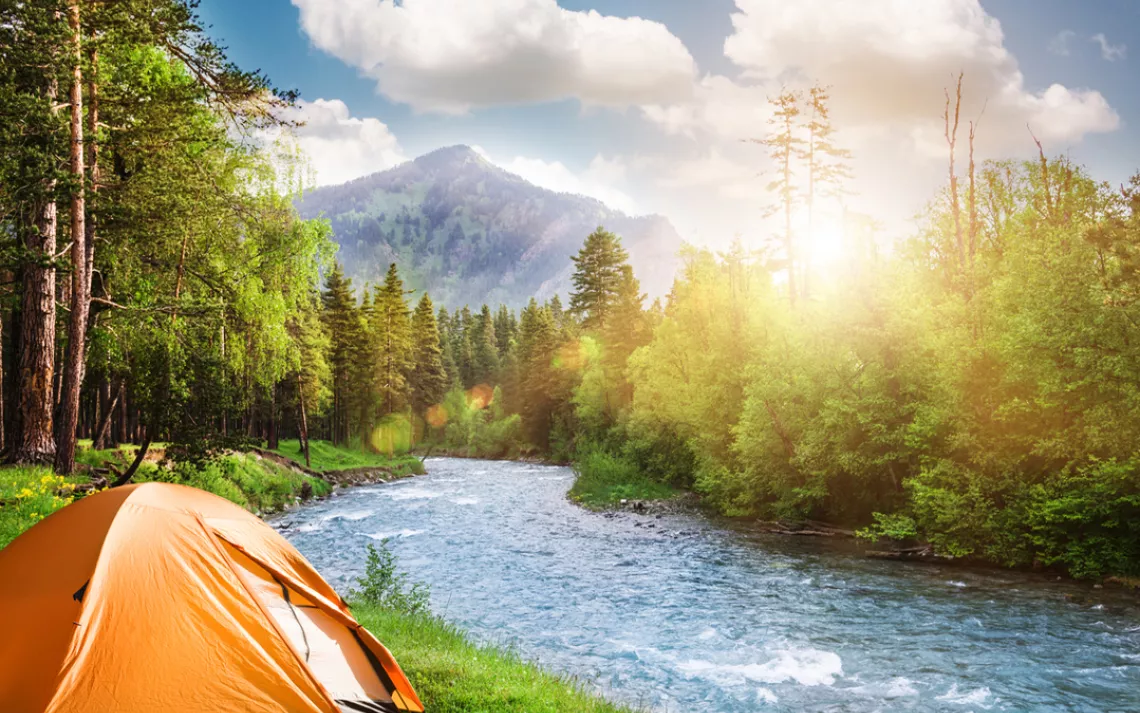5 Ways to Scout Out Your Next Campsite
Custom-tailor your next foray into the great outdoors

Photo by andreusK/iStock
Name a more iconic way to spend time with family and friends than camping. You can’t. Well, maybe you can, but you’d be hard-pressed to find a more environmentally conscientious way to get away. According to the 2017 North American Camping Report, sponsored by private campground network Kampgrounds of America, the pastime is on the rise—more numerous, more diverse, and younger campers are pitching tents in parks and forests this year. Those who camp are getting out more often, too: From 2014 to 2016, the number of people camping once a year has fallen 10 percent, while those camping twice or thrice has grown by 12 percent and 36 percent, respectively. So, why not join them? The question is, where to camp? And what kind of al fresco experience do you seek? How do you even know what you want?
These questions can be daunting, but don’t hang up that bedroll just yet—the internet has a slew of services to help you find your place in the great outdoors.
Ultimate Campgrounds offers an unpretty but robust campsite-finding tool. It catalogs information (updated monthly) on noncommercial public and government-owned campgrounds, regularly verifying more than 27,000 in the United States and 4,100 in Canada. Ultimate Campgrounds’ free basic map service boasts a bevy of useful information: drinking water, toilet/shower situations, price tiers, RV sites, months open, etc. If you’re willing to shell out a few dollars, its paid options—available for $3.99 on Android and iOS and $5.99 on macOS—offer filters for elevation, nearby hiking trails, and other criteria. (The Canadian mobile app is $1.99, and the military campground app is free.) The interface won’t win any design awards, but it’s clear that love was put into the service. Virtually gander into the app’s overflow menu and you’ll find a section called Campground Courtesy, a near-1,600 word essay on the etiquette of roughing it. Ultimate Campgrounds does not offer direct booking but does list contact information for most sites.
The antithesis of Ultimate Campgrounds, Hipcamp offers a modern, laid-back, and romantically millennial campsite-booking service. The site is marked by a spacious use of photography, sans-serif fonts on clean white backgrounds, as well as Airbnb-reminiscent layouts—and Hipcamp works with private landowners (“hosts”) to facilitate rental arrangements for campers looking to pitch a tent, park an RV, or lodge in an on-property cabin. National, state, and other public campgrounds are listed as well. Community interaction is paramount to Hipcamp—you must be a member to make a reservation, all interactions from hosting to booking require a name, and user recommendations for campsites are prominently displayed. Many reviews speak highly of hosts’ involvement in guests’ stays, so keep your own “personal attention while camping” preferences in mind. If you crave an interpersonal, web 2.0-style excursion, courtesy of someone you know by first name, Hipcamp is for you. (It also has an outdoors-themed Spotify playlist!)
As a government site, recreation.gov lists only federal and state campgrounds, but it performs this one task with unpretentious aplomb. Search for your preferred park or locate it on a map (the map features filtering options, including accessibility), and you’ll find an exhaustive trove of information. Unlike most other services, recreation.gov features detailed write-ups for almost every campground it lists. Each description outlines the park’s natural features, activities, facilities, and nearby attractions, and evidences a high degree of familiarity, providing perusers with a deeper sense of a park or site than a bulleted list ever could. At the end of each write-up, you’ll find a Know Before You Go section containing cancellation policies, contact information, visitor photo galleries, and even weather forecasts. What’s more, you can book on the spot—simply enter the dates you’d like to check in and depart; if they’re unavailable (this information is also found under the page’s “availability” tab), recreation.gov will find you the next available times to camp.
USCAmpgrounds offers a comparatively small selection of campgrounds (13,000 across the United States and Canada), but that’s because the site individually confirms the existence of each by crosschecking its location against a topographical map. The resulting database contains only human-verified, car-accessible family campgrounds boasting at least four sites. Drag and zoom around the site’s browser-based map and you’ll find campgrounds across the country. Click on a campground’s icon (color-coded with USCAmpgrounds’ classification system) to access the relevant facts (number of sites, elevation, amenities, etc.). USCAmpgrounds won’t let you reserve through its site, but each campsite on the map links to a custom Google search that should take you to the best booking resource. Also worth mentioning is the $5 Kampnik app for Android and iOS, which uses USCAmpgrounds’ database to power a streamlined mobile interface (much more user-friendly than USCAmpgrounds’ homely-at-best website) and allows users to curate favorites, make custom lists, and discover campgrounds based on proximity to any given location.
GoCampingAmerica is an unassuming service, neither as flashy as Hipcamp nor as rough-hewn as USCAmpgrounds. That doesn’t mean you should overlook it, though. It offers a rich selection of filters, allowing users to pare down results to those campsites with amenities as basic as firewood or as extreme as arcade rooms. Whether your ideal camping experience involves big rigs or yurts, bird-watching or water skiing, or even nudist or alcohol-free lifestyle options (no campsites offer both simultaneously; we checked), GoCampingAmerica is here to help make it happen. Pages for individual campgrounds are a cut-and-dry affair: You’ll find a short description and bulleted amenities, information about the campground administration, and a link to an external booking site. Interestingly, GoCampingAmerica posts regular articles about camping destinations, lifestyle, and other activities, under the Get Inspired tab. The novice or the just curious should definitely take a moment to read through its stories, touching on everything from U.S. ghost towns to National Barbecue Month celebrations.
 The Magazine of The Sierra Club
The Magazine of The Sierra Club